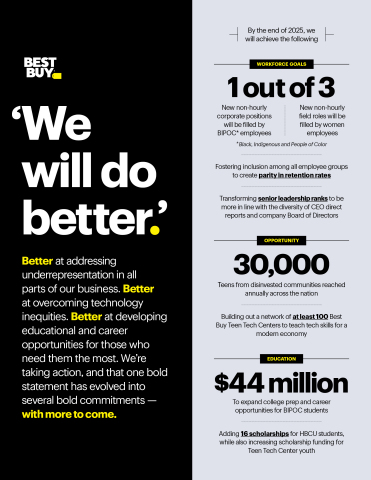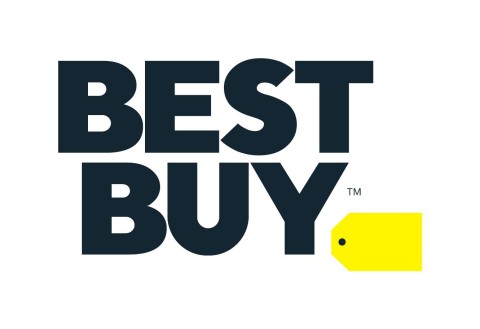Best Buy Commits More Than $44 Million to Diversity, Inclusion and Community Efforts
Best Buy Commits More Than $44 Million to Diversity, Inclusion and Community Efforts
The company’s five-year plan focuses on hiring BIPOC and women employees, along with creating more opportunities and post-secondary support for youth and emerging talent
MINNEAPOLIS--(BUSINESS WIRE)--Today, Best Buy is announcing actions we are taking to better address underrepresentation, technology inequities and educational and career opportunities for those who need it most.
In June, Best Buy CEO Corie Barry said we will do better. As a company, we committed to making systemic, permanent changes that address social injustices to improve our company and our communities.
We have spent the last several months making plans for how we can make meaningful impacts, including setting major company goals to address how we recruit, hire and retain our employees, and how we’re expanding opportunities for youth across the country.
“We know it’s incredibly important to our employees, customers and communities to show that we are committed to doing all we can to further economic and social justice,” Corie said. “In many ways, we have engaged in these issues for years — but now we’re being bold about our commitments to hold ourselves accountable for this work we’ve promised to do.”
We are now ready and proud to share these goals we aim to achieve by 2025:
- Fill one out of three new non-hourly corporate positions with BIPOC (Black, Indigenous and People of Color -- specifically Black, Latinx and Indigenous) employees. Additionally, one out of three new, non-hourly field roles will be filled by women.
- Foster inclusion among all employee groups to create parity in retention rates, including transforming our senior leadership ranks to be more in line with our board of directors.
- Reach 30,000 teens annually from disinvested communities across the nation, including building a network of at least 100 Best Buy Teen Tech Centers to teach skills and build a talent pipeline for a modern economy. Teen Tech Centers are places where teens can develop critical skills through hands-on activities that explore their interests in programming, filmmaking, music production and design.
- Provide $44 million to expand college prep and career opportunities for BIPOC students, including adding 16 scholarships for HBCU (Historically Black Colleges and Universities) students and increasing scholarship funding for Teen Tech Center youth.
- Expand opportunity for BIPOC teens in our home market of the Twin Cities by investing in more local Teen Tech Centers, creating a scholarship fund specifically for Twin Cities-based teens, committing to hosting 400 high school interns from Teen Tech Centers and other program partners, and offering 340 jobs across the company to teens.
How we will do this
To expand representation throughout the company, we are providing leadership-in-training roles to BIPOC and women employees. We will also invest in mentorship opportunities and match all BIPOC directors and officers with sponsors and coaches to enhance the employee experience, increase retention, and help our current and future leaders create meaningful connections.
Within the communities we serve, we will intensify our focus on disinvested populations and communities by partnering with BIPOC-serving organizations for new Teen Tech Centers across the country so youth can learn new skills, nurture positive adult and peer relationships, and discover future careers. We will also pilot a rural Teen Tech Center model to address the unique needs of geographically isolated communities.
To support youth after their high school careers, we are increasing post-secondary support at our Teen Tech Centers, including trained guidance counselors and financial aid navigators. And because not everyone’s career path looks the same, we will also partner with community colleges, credential programs and tech bootcamps to create opportunities for teens to explore all types of post-secondary options that will prepare them for future success.
Other company actions
Best Buy’s purpose is to enrich lives through technology, and we know we can’t do that without our employees. Our goal is to foster an inclusive company culture that embraces our differences and fosters an environment where employees can bring their whole selves to work.
One way we’re fostering an inclusive culture for our employees is by investing in learning opportunities and personal development programs to support their career journeys.
We have created a network of Inclusion and Diversity Steering Committees (IDSCs), cross-functional groups of leaders that focus on attracting and investing in top talent and fostering an inclusive workplace. We also have Employee Resource Groups (ERGs) that bring employees with shared life experiences or characteristics together to focus on recruitment and advancement of underrepresented employee populations.
Additionally, we are continuing to move forward with our Task Force for Racial Equity, which we formed in June with the intent to drive constructive enterprise-wide change. That task force, made up of 19 employees from across the company, is bringing forward even more actions for Best Buy to take. This includes addressing issues such as the career development and advancement of BIPOC employees and how the company is supporting BIPOC tech businesses.
Other recent actions include:
- Committing to hire 1,000 new employees to our technology team, with 30% of them being diverse, specifically Black, Latinx, Indigenous and women.
- Signing the ParityPledge in Support of People of Color and the ParityPledge in Support of Women.
- Making Juneteenth an official company holiday
- Holding a Day of Unity for employees to come together to show that we are one and support social justice.
During the pandemic, we took action to ensure teens from disinvested communities across the country had the technology they needed to participate in distance learning. One of our very first moves was to outfit 2,500 teens from our 35 Teen Tech Centers with a home computer and internet to attend school virtually. And many of our Teen Tech Centers opened to provide safe centers for local students to complete schoolwork, get meals, access mental health counseling, and stay connected to caring adults.
We also co-founded Partnership for ConnectedMN, a public-private initiative that brought together local businesses, community leaders and the State of Minnesota to provide internet and technology devices to an estimated 68,000 students and families to date across the state who didn't have access.
Contacts
Bianca Jones, Press@BestBuy.com

